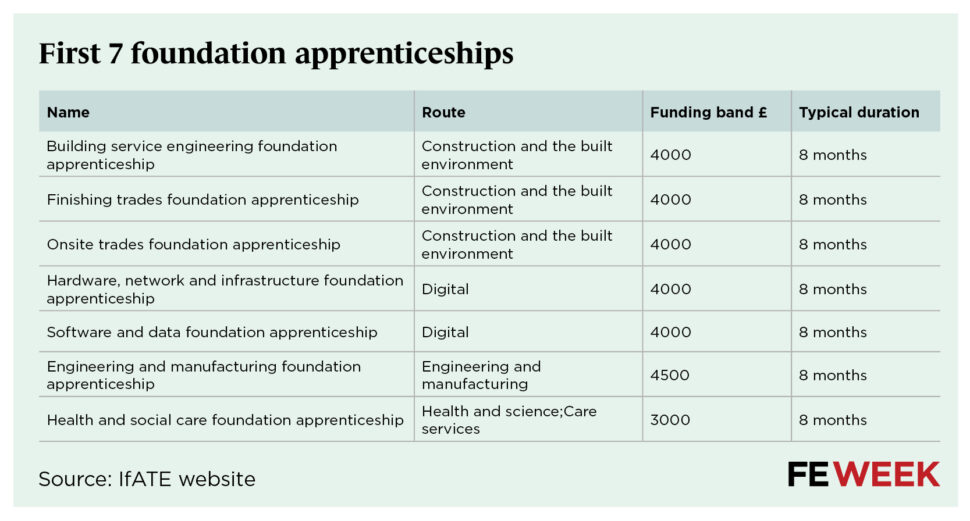Foundation apprenticeships have been branded a “missed opportunity” after ministers excluded high-demand industries including hospitality and retail from the inaugural list.
The government was also criticised for setting an eight-month training duration for the new entry courses – a timeframe which experts fear “blurs the lines” with level 2 apprenticeships.
A list of the first seven foundation apprenticeships was released by the Institute for Apprenticeships and Technical Education (IfATE) this week.
It includes three for the construction sector, two for digital, one for engineering and manufacturing and one for health and social care.
Maximum funding on offer to deliver the training ranges from £3,000 for health and social care, which one provider chief branded “laughable”, to £4,500 for engineering.
The programmes, expected to launch with starters in August, will be paid jobs. They are designed for 16 to 21 year olds but can be taken by a 22 to 24 year old if they have an education, health and care (EHC) plan, were in care or have been in prison.
A cash incentive of up to £2,000 is available to employers for each foundation apprentice they take on.
Rob West, head of education and skills at the Confederation of British Industry (CBI), said apprenticeships that can be done in under 12 months “appeal to employers” and financial bonuses for taking on and retaining foundation apprentices “could significantly boost interest”.
Tina McKenzie, policy chair at the Federation of Small Businesses (FSB), said it was “good to see” the government choose “appropriate standards” as the first foundation apprenticeships, including in “key areas such as digital, which small firms consider important for their business growth”.
She added that the £2,000 incentives should also mean “more SME apprenticeship starts”.
And Tim Balcon, CEO at the Construction Industry Training Board (CITB), said that while there was “no silver bullet to solve the skills shortage facing the construction industry right now”, he hoped foundation apprenticeships can be one of a “wide array of solutions” to address the issue.
Hospitality and retail snubbed
Employers and providers from the hospitality industry proposed a foundation apprenticeship but government officials rejected it on the grounds that hospitality is not deemed a “priority sector”.
This decision was “bitterly disappointing” for Kate Nicholls, chief executive of UKHospitality, who said her sector is the “largest employer of young people in the country and uniquely placed to deliver early career opportunities”.
“This is a real missed opportunity to further enhance the options available to young people,” she added.
Jill Whittaker, executive chair of hospitality apprenticeship provider HIT Training, told FE Week that employers from the industry were “falling over themselves” to get a foundation apprenticeship off the ground.
She said: “Volumes of people start their first career in hospitality. It doesn’t mean they’re necessarily going to stay in the industry, but it is the one sector where a fast-track course can give opportunity to an awful lot of people as that first stepping stone.”
Retail employers were equally frustrated.
Andrew Goodacre, CEO of Bira (British Independent Retailers Association), said: “It is disappointing to see retail overlooked. For many years retail has had a proud history of offering young people their first opportunity to work.
“Working in a shop offers lots of variety and helps young people learn a wide range of skills from technology to people. For some time apprenticeship schemes have not worked for the retail sector, which in itself is a frustration given how much the sector pays into the apprenticeship levy.”
Simon Ashworth, deputy CEO at the Association of Employment and Learning Providers, added: “Foundation apprenticeships are a welcome addition to the skills landscape. But to succeed, they should be sector-focused rather than tied to narrow occupational routes, and made available in high-demand areas like retail and hospitality where many young people first enter the labour market.”
Level 2 lines blurred
The DfE describes foundation apprenticeships as “jobs with training at level 2” which “provide a broad curriculum focusing on job-specific knowledge and skills, while also developing employability skills and behaviours to support the transition from education to work”.
Experts raised concern that an eight-month training duration was too long for an entry course.
Multiple level 2 apprenticeships are expected to be shortened to below 12 months when the government legislates to change the minimum duration – a move due to happen this year.
Whittaker said: “If a foundation apprenticeship is eight months why are you not just going to do a level 2? That is the long and short of it.”
“Four months is fast tracking, eight months feels like a lifetime when you’re 17,” she added.
Whittaker argued the DfE has legally tied its hands to an eight-month duration because it has called the foundation courses an apprenticeship, which is a protected term.
She also said the health and social care foundation apprenticeship funding band of £3,000 was “frankly laughable” and “not going to happen” in terms of training costs.
Ashworth believes the proposed minimum duration of eight months “risks blurring the lines with level 2 apprenticeships”.
Instead, these programmes “should be six months long, giving employers a distinct option that can also serve as a stepping stone into full apprenticeship programmes at level 2 and above”.
But Alex Veitch, director of policy at the British Chambers of Commerce, said the eight-month duration is “important to maintain rigour” for a valued qualification like apprenticeships.
The St Martin’s Group, a membership body for the country’s largest apprenticeship providers, is due to publish research about foundation apprenticeships with Ipsos next month.
A spokesperson said the study shows “mixed views as to whether foundation apprenticeships will be used”.“They appear to have more appeal for smaller employers, with larger employers more certain not to or unlikely to use them,” they added. “Views on their suitability also vary across sectors, so their success will require a nuanced approach and further engagement to communicate their potential impact and benefits effectively.”

















Your thoughts